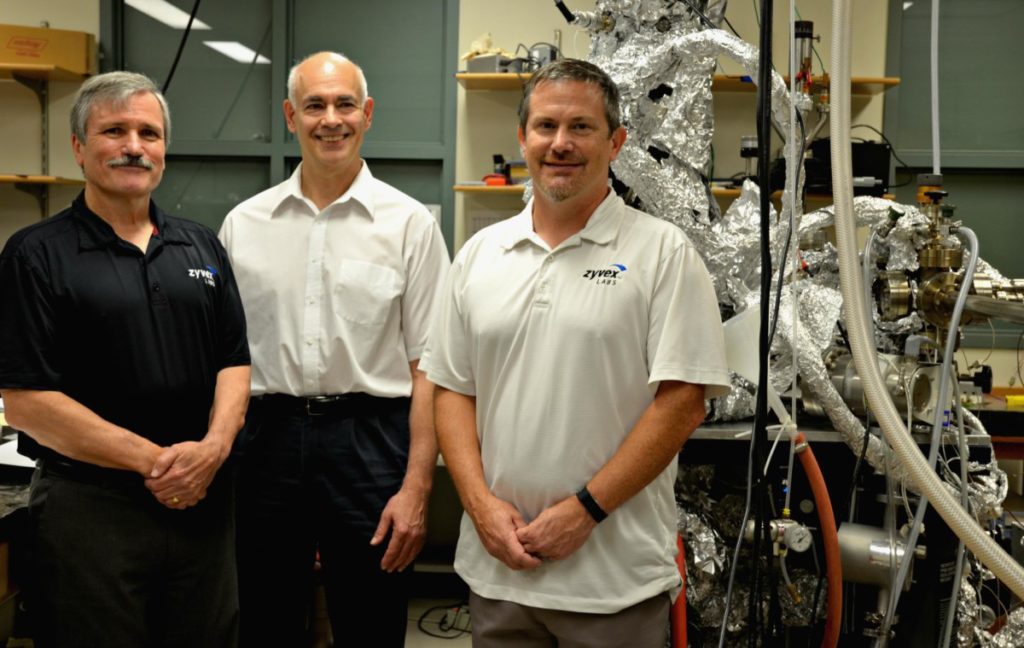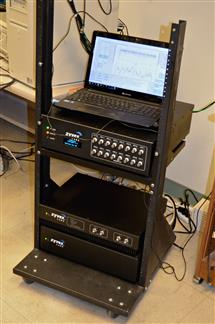Zyvex Labs Wins Department of Energy Small Business Technology Transfer Award
 Zyvex Labs along with Professor Reza Moheimani (UT Dallas), has won a Department of Energy (DOE) Small Business Technology Transfer (STTR) award to develop and commercialize Micro Electro Mechanical System (MEMS)-based Scanning Tunneling Microscope (STM) scanners. The kick-off meeting for this and other DOE SBIR and STTR programs will be held in Washington DC on August 9-10. Dr. James H. G. Owen, director of the Atomically Precise Manufacturing (APM) Division at Zyvex Labs will discuss our program “High Speed Platform for Highly Parallel STM lithography and Hierarchical Assembly” and talk about commercialization plans with the DOE. This program is a complement to Professory Moheimani’s DOE program “A Platform Technology for High-throughput Atomically Precise Manufacturing: Mechatronics at the Atomic Scale” which is also just starting and has Zyvex Labs as a subcontractor.
Zyvex Labs along with Professor Reza Moheimani (UT Dallas), has won a Department of Energy (DOE) Small Business Technology Transfer (STTR) award to develop and commercialize Micro Electro Mechanical System (MEMS)-based Scanning Tunneling Microscope (STM) scanners. The kick-off meeting for this and other DOE SBIR and STTR programs will be held in Washington DC on August 9-10. Dr. James H. G. Owen, director of the Atomically Precise Manufacturing (APM) Division at Zyvex Labs will discuss our program “High Speed Platform for Highly Parallel STM lithography and Hierarchical Assembly” and talk about commercialization plans with the DOE. This program is a complement to Professory Moheimani’s DOE program “A Platform Technology for High-throughput Atomically Precise Manufacturing: Mechatronics at the Atomic Scale” which is also just starting and has Zyvex Labs as a subcontractor.
The ability to produce small, fast, and accurate nanopositioning will be exploited to enable various processes in Atomically Precise Manufacturing including, lithography and hierarchical assembly of atomically precise parts into more complex systems. We will also explore other operations such as inspection and metrology that can benefit from highly-parallel, high-speed and high-accuracy MEMS systems. Zyvex Labs is excited to continue our already very beneficial interactions with Professor Moheimani who brings a wealth of experience and world-class expertise in automation and control at the micro and nanoscale.
Zyvex Lab’s ZyVector™ Control system provides the world’s highest (sub-nm) resolution lithography technology. Click here for more information.
The Zyvex Creep and Hysteresis Correction Controller is a live tip position control for fast settling times after landing, and precise motion across the surface. Click here for more information.
James Owen Presents on Atomically Precise Manufacturing at the Advanced Manufacturing Office of the Department of Energy Peer Review

Dr. James H. G. Owen, director of the Atomically Precise Manufacturing (APM) Division at Zyvex Labs will present a talk on “Atomically Precise Manufacturing for 2D-Designed Materials” at the Department of Energy’s (DOE) Advanced Manufacturing Office Peer Review on July 16-19, 2018 in Washington DC. This will be an auspicious occasion as it will be the first public presentation of the first specific funding by the US Government of Atomically Precise Manufacturing. Zyvex Labs was fortunate to be awarded one of the five Atomically Precise Manufacturing programs awarded by the DOE and also be a subcontractor to UT Dallas who won another of the APM awards.
Zyvex Lab’s ZyVector™ Control system provides the world’s highest (sub-nm) resolution lithography technology. Click here for more information.
The Zyvex Creep and Hysteresis Correction Controller is a live tip position control for fast settling times after landing, and precise motion across the surface. Click here for more information.
Rahul Saini is one of the Finalists in the Technology Inventor’s Category in the 2018 Tech Titan’s Award Gala

Rahul Saini of Zyvex Labs and Teliatry is one of the Finalists in the Technology Inventor’s Category in the 2018 Tech Titan’s Award Gala.
Rahul is the system architect of the most complicated and advanced implant ever made to restore vision for blind patients with Retinitis Pigmentosa (RP) & Advanced Macular Degeneration (AMD) & commercialized by Nano Retina Inc. as NR600TM. He has multiple patents awarded/pending for this wireless, batteryless implant that is the size of a grain of rice. His out of box thinking for NR600 employs minimally invasive array of penetrating needles along with a laser being shot into the retina for the implant to work! He continued forging his vision of injectable implants and built his next implant, “Firefly” for Texas Biomedical Device Center (TXBDC) that for treating diseases that currently have no cure like Multiple Sclerosis, Tinnitus, PTSD, and spinal cord injury. Teliatry Inc. http://www.teliatry.com/is commercializing this breakthrough device that is safe and minimally invasive for neurological conditions like Chronic Pain, Heart Failure, Epilepsy, Depression, Addiction, Attention Deficit disorder and more.
The Tech Titans Awards Gala recognizes the elite in North Texas technology – individuals currently transforming the high-tech industry and giving companies that competitive edge, as well as companies leading the way. The Tech Titans Awards Gala showcases the innovators, adopters and executors impacting the technology industry for the greater good.
Award categories recognize large companies, small companies, executives, individual employees, investment catalysts, students, teachers and even companies which support the high-tech sector. See a full list of categories and their descriptions on the Tech Titans Awards nominations website. Companies should have operations in the DFW area.
The winners of the 2018 Tech Titan Awards Gala will be announced Friday, August 24, 5:30 – 10 pm Renaissance Dallas at Plano Legacy West Hotel.
Zyvex Lab’s ZyVector™ Control system provides the world’s highest (sub-nm) resolution lithography technology. Click here for more information.
The Zyvex Creep and Hysteresis Correction Controller is a live tip position control for fast settling times after landing, and precise motion across the surface. Click here for more information.
John Randall to Receive MNE Fellow Award
Zyvex Labs’ President, John Randall, has been named the recipient of the 2018 MNE Fellow Award. This award recognizes outstanding researchers/engineers who made a significant advance in Micro- and Nanoengineering and related fields covered by the MNE conference.
Randall has been invited to the MNE conference in Copenhagen (www.mne2018.org) on September 24-27, 2018 for a plenary presentation. The presentation will be centered on a Digital Atomic Scale Fabrication Technology (Digital FT) that will exploit many of the Digital IT advantages that have led to Digital IT dominance over Analog IT. The Digital FT will use the making and breaking of chemical bonds as the binary process, will employ a spatial digital address grid, and will have error detection and correction methods. The goal of Digital FT will be to enable Atomically Precise Manufacturing (APM). APM can introduce another exponential manufacturing trend that will replace Moore’s Law and can be considered an Inverse Moore’s Law, where instead of improving manufacturing precision and downscaling, APM will attain Atomic Precision (AP) at the nano/micro scale and maintain AP while scaling up to larger and larger volumes of cost-effectively manufactured AP products. The exponential growth of APM will not only increase the size, but also the range of products for a wide variety of applications.
Prior to the presentation, Randall will be presented with the award by the chairman of the MNE Fellow Award committee and a representative to the institution sponsoring the prize.
The Rules and Eligibility for the award are outlined below:
- The nominee must have inspired and/or impacted the MNE community significantly. For example, the nominee’s work might have led to a widely used method or tool in the Micro- and Nanoengineering field.
- The work recognized by the nomination must be of sufficient interest to be adequate for a plenary presentation.
- The nominee must have strong research roots in Europe by having done a significant part of the research activities in Europe.
- The nominee must be able to attend the next MNE conference, and agree to give a plenary talk.
Former MNE Fellows include:
- Dr. Haroon Ahmed from University of Cambridge (founder of Microengineering conference, which became the Micro & Nanoengineering conference) at MNE 2003, Cambridge
- Dr. Peter Vettiger from IBM Research – Zurich at MNE 2005, Vienna
- Dr. Mike Hatzakis from NCSR Demokritos Athens at MNE 2006, Barcelona
- Dr. Bruno Murari from ST Microelectronics at MNE 2010, Genoa
- Dr. Luc Van den Hove from IMEC at MNE 2011, Berlin
- Dr. Hans Löschner from IMS Nanofabrication AG in Austria at MNE 2012, Toulouse
- Prof. Dieter Kern from University of Tübingen at MNE 2014, Lausanne
- Dr. Emile van der Drift from TU Delft at MNE 2015, The Hague
- Prof. Nico de Rooij from EPFL Lausanne and CSEM SA at MNE 2016, Vienna
- Prof. Andreas Manz from Saarland University of Saarbrücken at MNE 2017, Braga
Zyvex Lab’s ZyVector™ Control system provides the world’s highest (sub-nm) resolution lithography technology. Click here for more information.
The Zyvex Creep and Hysteresis Correction Controller is a live tip position control for fast settling times after landing, and precise motion across the surface. Click here for more information.
UT Dallas Team’s Microscopic Solution May Save Researchers Big Time
A University of Texas at Dallas graduate student, his advisor and industry collaborators believe they have addressed a long-standing problem troubling scientists and engineers for more than 35 years: How to prevent the tip of a scanning tunneling microscope from crashing into the surface of a material during imaging or lithography.
See the whole story at: UT Dallas NewsCenter
Zyvex Labs wins DOE Emerging Research Exploration projects
We would like to announce that Zyvex Labs with UT Dallas, NIST and 3DEpitaxial Technologies as subcontractors has been awarded one of 24 projects under the Dept of Energy Emerging Research Exploration projects.
Vice versa, Zyvex Labs and NIST are subcontractors on a project awarded to a team at UT Dallas.
https://energy.gov/eere/amo/articles/emerging-research-exploration-project-descriptions
Michelle Simmons wins “Australian of the Year” award
Michelle Simmons, long time collaborator and good friend of Zyvex Labs has been named “Australian of the Year”, not the “Australian Scientist of the Year”, nor the “Australian Woman of the Year”, but THE “Australian of the Year”. We are extremely proud of her and her team at the University of New South Wales and are pleased to be counted among her friends. We are also impressed at the excellent values of Australia to recognize the value of Science and Innovation.
News coverage of the event can be seen at: http://www.abc.net.au/news/
SRI and Zyvex Labs win Best Application Paper Award at MARSS
A paper entitled, “2D Automated Microassembly using the Milli-robots” submitted to the 2017 International Conference on Manipulation, Automation and Robotics at Small Scales (MARSS) in Montreal by Zyvex Labs and SRI as part of the DARPA A2P program won the Best Application Paper Award.
Zyvex donation enhances Lyding’s research
Professor Joseph W Lyding is grateful to Zyvex Labs for their donation of the 20-bit ZyVector scanning tunneling microscope (STM) control system to his Nanoelectronics and Nanomaterials Group. Zyvex Labs designs atomically precise manufacturing technology for microscopic accuracy when building products.

Left to right: Zyvex President John Randall, ECE ILLINOIS Professor Joseph Lyding, and Josh Ballard, Lyding’s former post-doctoral collaborator and current director of Atomically Precise Manufacturing at Zyvex Labs.
“I can’t tell you how much I appreciate what you’ve given us, and what it entails to the possibilities of what can be done compared to what we’ve been working with,” said Lyding at a gathering last week to mark the donation. Lyding, Robert E. MacClinchie Professor in Electrical and Computer Engineering, conducts research at the Beckman Institue.
The ZyVector assists in finding optimal voltage and current conditions to tune the effective lithography linewidth from a single atom to greater than 10 nanometers. It is also optimized for operation on passivated surfaces such as Si (100)-H. Write times can be optimized by applying a vector-based approach to the lithography with minimized path lengths and switching operations. Multiple pattern input modes are available including script-based patterns, CAD, or simple bitmap.
Prof. Lyding’s relationship with Zyvex preceeds this donation. One of Lyding’s former post-doctoral collaborators, Josh Ballard, is the director of Atomically Precise Manufacturing at Zyvex Labs. In 2008, Ballard, formerly a Beckman Postdoctoral Fellow, joined Zyvex Labs for the tip-based nanomanufacturing program.
Prof. Lyding also has a long history of interaction with Zyvex President John Randall, starting while Dr. Randall worked at Texas Instruments. “That system over there,” Lyding said, gesturing toward equipment in his lab, “and the one in the next room, which is scanning some molecules right now, were funded by Texas Instruments through John Randall’s effort. He’s enabled a lot of research that we’ve published over the years.”
Around ten PhD students have received their degrees working with this very equipment. With the new ZyVector, a host of possibilities emerge for Lyding’s lab.
“The ZyVector is ideally suited to control our scanning tunneling microscopes,” Lyding said. “It is optimized for atomic precision patterning of hydrogen passivated silicon, using a process originally developed in our laboratory at Beckman. The ZyVector will add new capability to our research with its state-of-the-art control system and its ability to ‘lock-in’ to the atomic lattice,” said Lyding to the Beckman Institute.
Original article: http://www.ece.illinois.edu/newsroom/article/23366
For more information, please also see the Beckman Institute’s article: https://beckman.illinois.edu/news/2017/07/zyvex
Zyvex Labs and Scienta Omicron announce collaboration (March 2016)
Scienta Omicron and Zyvex Labs announce a collaboration to develop and distribute tools for research and manufacturing that require atomic precision. The ZyVector STM Control System from Zyvex Labs turns Scienta Omicron STMs into an atomically-precise scanned-probe lithography tools, and will be distributed world-wide by Scienta Omicron.Scienta Omicron brings together the two leading innovators in Surface Science – the former VG Scienta and Omicron NanoTechnology. This exciting new company creates new capabilities for the research community by combining the technology leaders in electron spectroscopy, scanning probe microscopy and thin film deposition. These capabilities are available in custom tailored systems from one source with sales and service groups located in all major markets around the world.
Zyvex Labs LLC pursues the vision to develop Atomically Precise Manufacturing (APM). Recently, Zyvex Labs has developed ZyVector TM for automated STM Lithography to enable users to create quantum computers and other transformational systems that require atomic precision. By pairing it with Scienta Omicron STMs, unmatched lithography will be possible, with much higher reproducibility and throughput, scaling up from research level patt erning towards APM. See more at www.zyvexlabs.com
Capabilities:
ZyVector TM automates the process of performing Hydrogen Depassivation Lithography (HDL), using an STM tip to remove H atoms from a surface. It can write arbitrary patterns defined in a vector or a bitmap format. Patterns can be written using a lithography pixel defined by the atomic lattice. As well as developing ZyVector TM as a tool for atomically precise patterning on small scale, researchers at Zyvex Labs are leveraging its capabilities to create nano-functional devices on the micrometer scale. ZyVector TM therefore opens up new possibiliti es to scale up SPM based lithography by setting new standards in reproducibility, automation, thermal drift and piezo creep compensation.
